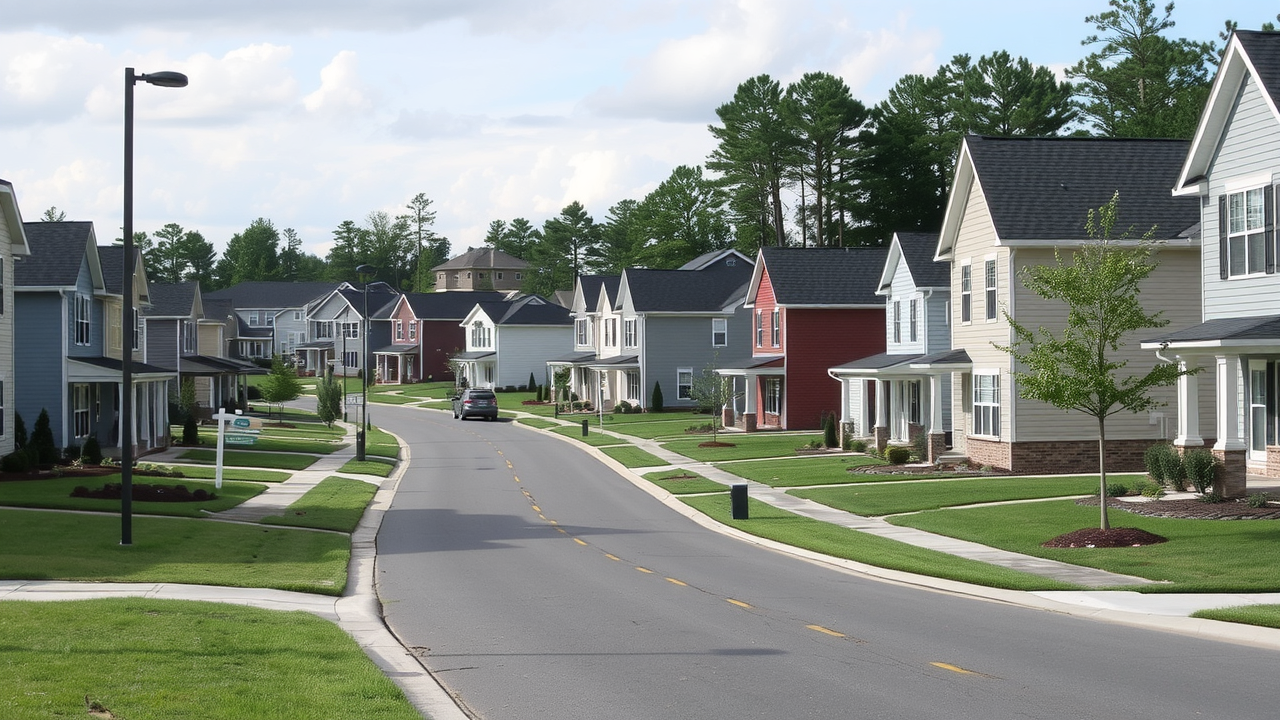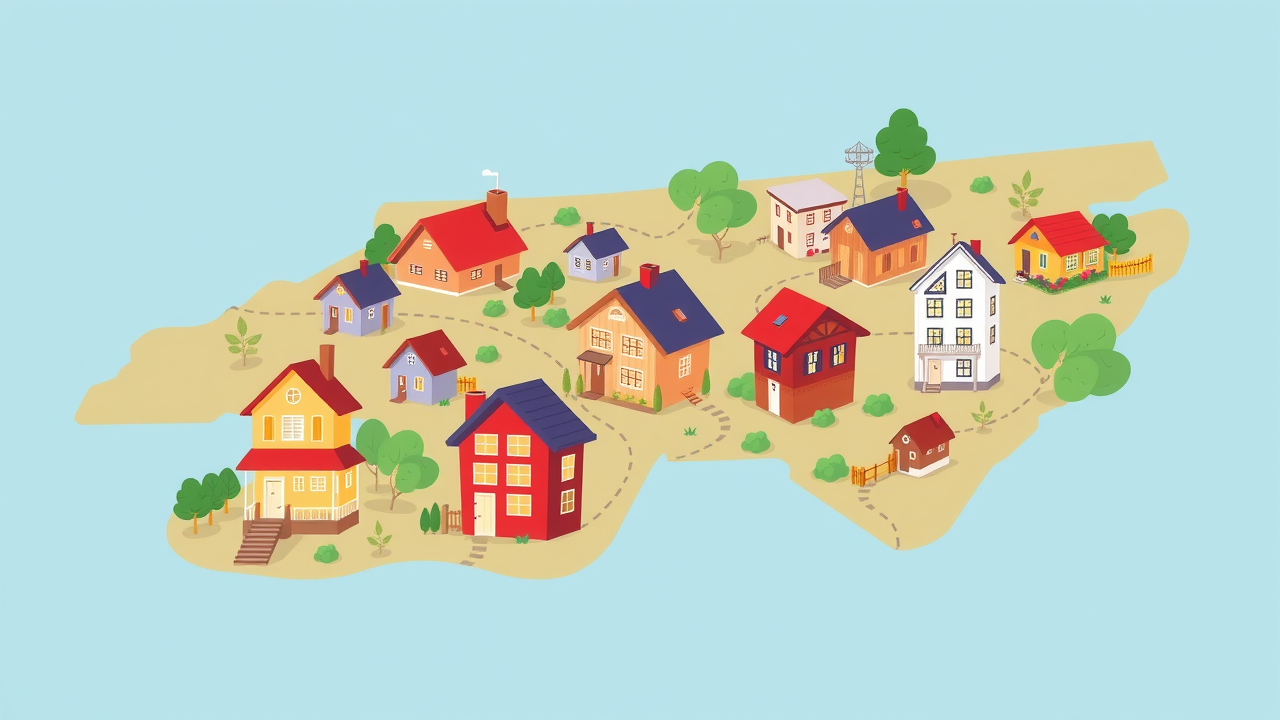
Did you know? In the last five years, North Carolina home prices have skyrocketed by over 25%, far outpacing many other southeastern states.
If you’re planning to buy a house in North Carolina, understanding the unique NC home buying process is essential beyond just the beautiful homes and southern charm. From unique due diligence periods to surprise closing costs, the Tar Heel State offers both challenges and little-known advantages on the road to homeownership. This comprehensive guide reveals the critical NC-specific insights most realtors won’t tell you—so you can buy smarter, avoid costly missteps, and thrive in today’s dynamic real estate market.
The Realities of Buying a Home in North Carolina: Eye-Opening Stats and Surprising Facts
The North Carolina real estate market has evolved dramatically, making the home buying experience increasingly competitive for all home buyers. Over the past few years, the state has seen housing inventory tighten and sale prices trend upward, forcing buyers to act swiftly and strategically. This environment catches many first-time home buyers off guard—especially those relocating from markets with different customs and timelines.
“Did you know that North Carolina home prices have increased by over 25% in the last five years, outpacing many other states in the southeast?”
But don’t let rising prices or low inventory scare you away. Mastering the North Carolina home buying process and leveraging insider tips can give you a competitive edge in today’s dynamic housing market.
This guide breaks down exactly what makes the NC home buying process unique, ensuring you stay ahead of bidding wars, navigate disclosure requirements, and leverage little-known local opportunities to your advantage.

Why Buying a Home in North Carolina Is Different Than Anywhere Else
-
Specific home buying requirements unique to the NC home market
-
Insights on North Carolina property taxes and closing costs
-
The structure of the home buying process in the state
When you decide to buy a home in North Carolina, it’s important to recognize the critical differences in the state’s buying process compared to other markets. From the distinctive “due diligence” period—which sets North Carolina apart—to unique closing cost breakdowns and property tax structures, it’s vital for every home buyer to understand these nuances upfront.
For instance, property taxes in North Carolina are calculated county by county and can impact your ongoing costs considerably. Likewise, closing cost calculations often include North Carolina-specific fees, state-imposed excise taxes, and even requirements for local attorneys at closing. Educating yourself on the full home buying process in North Carolina, including these state and local requirements, will help you avoid unexpected expenses and make more confident decisions from offer to closing.
As you plan your budget, it’s worth noting that there are several practical ways to reduce your out-of-pocket expenses at closing. For a deeper dive into actionable strategies, check out these tips to minimize closing costs in North Carolina —a resource that can help you keep more money in your pocket during the final stages of your home purchase.
Understanding the Home Buying Process: What Every NC Home Buyer Needs to Know
Key Stages in the North Carolina Home Buying Process
-
Pre-approval and finance options
-
Making competitive offers on real estate
-
Legal nuances of the Carolina home market
The North Carolina home buying process starts with financial preparation. Most home buyers begin by obtaining mortgage pre-approval, which not only validates your purchase power but also positions your offer to stand out in a crowded market. Lenders in North Carolina offer a variety of mortgage loan options, from conventional to specialized VA and USDA loans for rural or eligible buyers.
Once pre-approved, you’ll move on to making offers—a process that involves understanding the unique legal nuances of North Carolina’s real estate contracts. Here, the “due diligence” period is especially important. This non-refundable deposit (paid directly to the seller) secures your right to inspect the property and negotiate or walk away, a system few other states employ. Knowing how and when to utilize this period gives you negotiating power while protecting your earnest money investment.
Home Appraisal and Inspection: NC-Specific Factors
“Unlike many states, North Carolina requires a unique due diligence period—understand its importance before you buy a house.”

In the North Carolina home buying process, both the home appraisal and home inspection are crucial steps to ensure a sound investment. The appraisal confirms the property’s value so your lender can approve the mortgage loan amount, while a quality inspection ensures you catch potential issues before you commit. North Carolina’s “due diligence” window gives buyers the right to inspect for hidden issues—ranging from termite infestations common in the humid climate to weather-related risks like hurricanes or flooding.
Partnering with experienced local professionals for these assessments can save you thousands in unforeseen repairs and help you use inspection findings to negotiate sale price or necessary repairs with sellers. Always check if your inspector is licensed in North Carolina and request detailed reports that cover region-specific concerns, such as radon levels or crawlspace moisture.
Finding the Right Real Estate Agent When Buying a Home in North Carolina
What to Look for in a North Carolina Real Estate Agent
-
Local expertise with the NC home market
-
Familiarity with property taxes, closing cost, and state forms
Selecting a knowledgeable real estate agent with expertise in the North Carolina home market can significantly improve your buying experience. Their localized expertise equips you with up-to-the-minute insights on neighborhoods, market trends, and even off-market properties. Look for agents who truly understand the ins and outs of North Carolina closing costs and can explain the implications of regional property taxes . An expert local agent can help you craft strategic offers, anticipate potential negotiation sticking points, and connect you to proven home inspectors and mortgage lenders.
A reputable estate agent should provide clear documentation on closing cost estimations and unique North Carolina disclosure forms. Don’t be afraid to request recent references and verify the agent’s track record in your preferred area—especially if you’re a first-time NC home buyer or relocating from out of state.
Questions Every NC Home Buyer Should Ask Their Agent
-
Experience in the specific buying process
-
Past transactions with North Carolina home buyers

Before hiring a real estate agent, ask them about their familiarity with the entire NC home buying process . How many North Carolina transactions have they closed in the past year? Do they have experience with unique legal and tax considerations in your chosen city or county? The best agents can answer questions about local market competition and property tax rates without hesitation.
You’ll also want to confirm their negotiation tactics for dealing with hot North Carolina markets and for guiding buyers through multiple-offer situations. Use their experience to clarify every aspect of the process, from offer deadlines and earnest money deposits to recommended attorneys for your closing day.
Understanding Property Taxes, Closing Costs, and Fees in North Carolina
Breaking Down North Carolina Closing Costs and Other Expenses
|
Typical Closing Costs for Buying a Home in North Carolina |
|
|
Expense |
Average Cost Range |
|---|---|
|
Loan Origination Fee |
$1,000 - $2,000 |
|
Title Insurance |
$500 - $1,200 |
|
Property Taxes |
Varies by county |
|
Home Inspection |
$300 - $600 |
|
Appraisal Fee |
$350 - $600 |
In North Carolina, buyers should prepare for a range of closing costs that go beyond the purchase price of the home. Loan origination fees, title insurance, inspection costs, and property taxes all contribute to your out-of-pocket expenses at closing. Unlike some other markets, North Carolina often requires the involvement of an attorney for real estate closings, which may add to your total expense.
These fees can fluctuate based on the county and the home’s sale price, so getting advance estimates—and clarifying what’s customary in your target area—will help you budget effectively. Always ask your real estate agent or loan officer for Good Faith Estimates and review local closing cost calculators for more precise planning.
Property Tax Implications for NC Home Buyers
“Property taxes in North Carolina can range sharply based on region, so know your county rates before making an offer.”
Property taxes in North Carolina are assessed at the county, municipal, and sometimes even special district level, which can lead to significant differences between neighboring areas. For example, property tax rates in Mecklenburg County (Charlotte) may be higher than those in neighboring Union County. This means the ongoing cost of homeownership can change dramatically depending on location—even for homes with similar sale prices.
Buyers should always check the latest county tax rates and budget accordingly, as property taxes directly impact your mortgage payment and overall affordability. Your real estate agent should help you compare property taxes on your favorite neighborhoods and factor this data into your monthly and annual homeownership costs.
How the NC Housing Market Impacts Home Buyers
Current Trends in the North Carolina Housing Market
-
Median prices by region
-
Real estate inventory levels (buyer vs. seller advantage)
-
Competition and average time on market

The North Carolina housing market has experienced robust price growth and shifting supply and demand dynamics in recent years. Median sale prices vary by region—urban areas like Raleigh-Durham and Charlotte tend to command higher prices and faster sales, while mountain and coastal regions display more seasonal trends. Currently, the state leans toward a seller’s market, with many homes listed receiving multiple competitive offers.
Understanding regional market trends is vital for North Carolina home buyers, especially if you want to buy a house in a high-demand area. Data points like days on market, list-to-sale price ratios, and inventory volumes will influence your offer strategy and timeline. Experienced real estate agents can provide hyper-local insights to help you make smart, timely decisions despite market competition.
Maximizing Payment Assistance Programs and Down Payment Help in North Carolina
Overview of Popular Payment Assistance and NC Home Advantage Programs
-
NC Home Advantage Mortgage®
-
NC 1st Home Buyer Grant
-
Other payment assistance avenues for first-time and repeat home buyers
North Carolina supports buyers with several payment assistance and home advantage programs aimed at first-time and move-up home buyers. Chief among these is the NC Home Advantage Mortgage® , which offers down payment assistance up to 3% of the loan amount for eligible buyers—making homeownership much more attainable. The NC 1st Home Buyer Grant can provide additional funds for true first-timers, while other programs target rural purchases or specialty buyer profiles.
These programs not only reduce your cash required at closing but also deliver peace of mind for buyers concerned about liquid savings. Be sure to check requirements such as maximum income limits, property type eligibility, and minimum credit score thresholds before applying.
Eligibility and Application Tips for North Carolina Home Buyers

To qualify for most North Carolina payment assistance and home advantage programs, you generally need to meet specific guidelines around income, property location, and intended use as a primary residence. Start by gathering supporting documentation, including pay stubs, federal tax returns, and accurate credit reports. Many programs prioritize first-time buyers, but repeat buyers who haven’t owned in several years may also qualify.
Work closely with your mortgage lender or estate agent to ensure all paperwork is submitted correctly and on time. Application windows and funding pools for these programs can close quickly—so the earlier you apply and are pre-approved, the better your odds of securing assistance for your North Carolina home purchase.
Insider Strategies: Navigating Home Offers and Negotiations in the Carolina Home Market
-
Writing offers: Details unique to buying a house in North Carolina
-
Due diligence fees vs. earnest money explained
-
Negotiating repairs after home inspection
In North Carolina, writing an offer involves choosing the right combination of due diligence fee and earnest money deposit. The due diligence fee secures the inspection period for the buyer and is typically nonrefundable, regardless of whether you close on the home. Earnest money, by contrast, is usually refundable under certain conditions. Understanding these distinctions is critical to protecting your interests and leveraging negotiating power during the offer process.
Once inspections are complete, buyers have the chance to renegotiate repairs or price adjustments based on the findings—an essential stage of the transaction. Rely on your real estate agent’s negotiation skills and knowledge of local competition to secure the best deal on your new North Carolina home.
Essential NC-Specific Home Inspection and Appraisal Insights
Must-Know Home Inspection Checklist for Buying a Home in North Carolina
-
Radon and termite testing for NC homes
-
Local weather risks: floods, hurricanes
-
Common issues in older North Carolina homes

The humid climate and rich biodiversity of North Carolina mean home inspections must be thorough and NC-specific. Always request radon and termite testing , especially for older homes or properties with wood framing. Inspectors should also look for flood or hurricane damage, particularly in coastal or low-lying areas. Foundation shifting, crawlspace moisture, and outdated electrical systems are common in vintage Carolina homes.
Arming yourself with a comprehensive inspection report allows you to make informed decisions about repairs and renegotiations—and could help you avoid tens of thousands in post-purchase surprise expenses.
What to Expect from Your Home Appraisal When Buying a North Carolina Home
Home appraisals are a standard contingency in the North Carolina home buying process . Appraisals protect both the buyer and the lender by verifying that the contract price does not exceed the fair market value of the home. If an appraisal comes in lower than the purchase offer, you may need to renegotiate the sale price, increase your down payment, or, in some cases, walk away if agreement cannot be reached.
Appraisal issues are more frequent in markets experiencing rapid growth, so understanding how comparables (recent, similar sales) are selected in North Carolina is key to anticipating appraisal outcomes and planning your move-in timeline.
Securing Financing: Mortgage Options for North Carolina Home Buyers
Comparing Mortgage Lenders and Loan Types for NC Home Buyers
|
Popular Mortgage Types for Buying a |
Home in North Carolina |
|
Mortgage Type |
Typical Requirements |
|---|---|
|
Conventional |
620+ credit score |
|
FHA |
580+ credit score, lower down |
|
USDA |
Rural properties only |
|
VA |
Veterans & active-duty |
North Carolina home buyers have access to diverse mortgage options tailored to various credit scores, down payment abilities, and property types. Conventional mortgages require higher credit scores but offer competitive rates. FHA loans allow for low down payments, while USDA and VA loans support rural buyers and military families with favorable terms and low (or zero) down payment requirements.
Your real estate agent or mortgage broker can recommend the best fit based on your location, financial status, and long-term homeownership goals in North Carolina.
Tips on Getting Pre-Approved for a Mortgage in North Carolina
Mortgage pre-approval is crucial in today’s North Carolina housing market. Compile recent pay stubs, W-2s, and checking account statements to streamline your application. Pre-approval shows sellers you’re a serious buyer and gives you clarity on your price range and monthly mortgage payment, including taxes and insurance. Be prepared to explain any unusual banking activity or credit dings—lenders will scrutinize your financial picture closely before granting approval in this competitive environment.
Shopping around for rates from both local and national lenders can save you thousands over the life of your mortgage loan. Don’t forget to ask lenders specific questions about discount points, lock-in periods, and closing cost rebates that could further lower your out-of-pocket expenses when purchasing a home in North Carolina.
Preparing Financially for Buying a Home in North Carolina
-
Saving for your down payment and closing cost
-
Budgeting for property taxes and ongoing fees
-
Understanding credit score requirements for NC home buyers

For many North Carolina home buyers, saving enough for a down payment remains the biggest financial challenge . With median sale prices continuing to climb, it’s more important than ever to also set aside extra funds for closing costs, immediate home repairs, and moving expenses. Don’t overlook recurring expenses: monthly property taxes , homeowners insurance, and HOA fees (if applicable).
Understanding your credit score is equally vital, as most mortgage options in North Carolina require a minimum score (often 620 for conventional loans, 580 for FHA). Lower scores don’t always disqualify you, but may result in higher interest rates or limited payment assistance eligibility. Use credit monitoring tools to spot opportunities for improvement before submitting a mortgage application.
Navigating Legal Requirements and Disclosures When Buying a North Carolina Home
Critical North Carolina Disclosures and Legal Steps
-
“Due diligence” period and deposits
-
Required real estate disclosures for home buyers
North Carolina law requires sellers to provide a variety of disclosures to home buyers , including the Residential Property and Owners’ Association Disclosure Statement and the Mineral and Oil Rights Disclosure. The process formally begins when the buyer provides a due diligence deposit, which secures the right to inspect the property thoroughly and back out of the deal if inspections reveal serious flaws.
Always review all provided disclosures carefully and consult your real estate agent or an attorney to clarify anything unclear. Completing these legal steps thoroughly means you can complete your North Carolina home purchase with confidence.
The Final Steps: From Offer Acceptance to Closing on Your North Carolina Home
Essential Next Steps in the Buying Process
-
Final walk-through and contingency removals
-
Title search, home insurance, and settlement

Once your offer is accepted, completing the North Carolina home buying process involves finalizing mortgage paperwork, obtaining homeowner insurance, and conducting a title search to ensure clear ownership. The final walk-through ensures any negotiated repairs are complete and the home matches contract conditions. At closing, you’ll sign the settlement statement, pay remaining closing costs, and get the keys to your new North Carolina home ! Be sure to clarify the timeline for transferring utilities and scheduling your move-in.
Engage your estate agent and attorney (if required) for final document checks before wiring funds or signing the closing paperwork. Taking these meticulous steps reduces the risk of post-closing surprises and ensures a smooth start to homeownership in North Carolina.
People Also Ask: Is North Carolina a Good State to Buy a House?
Exploring North Carolina’s Pros and Cons as a Home Buying Destination
North Carolina is widely regarded as a great state to buy a house —thanks to its moderate cost of living, diverse job opportunities, and highly livable cities. The state offers everything from urban excitement to rural tranquility, top-rated schools, and attractive climates in both mountains and coastal areas. However, challenges exist: increasing median sale prices, hurricane risks in some eastern counties, and tight inventory in rapidly growing cities. For carefully prepared buyers who work with local experts, the pros usually far outweigh the cons.
Potential buyers are drawn by steady long-term equity gains and unique financial assistance options available exclusively in North Carolina. Assess your family’s priorities, lifestyle goals, and desired amenities to choose the best location for your NC home purchase.
People Also Ask: How Much Money Do I Need to Buy a House in NC?
Home buyers in North Carolina generally need at least 3%–5% of the home’s sale price for a down payment, plus an estimated 2%–5% of the purchase price in closing costs. On a $350,000 home, that equates to roughly $16,000–$35,000 up front. First-time buyers using payment assistance programs could reduce their out-of-pocket costs. Always confirm exact numbers with your lender and real estate agent based on your loan type and local specifics.
People Also Ask: What is the $15,000 NC Home Advantage Program?
The NC Home Advantage Program provides qualified first-time home buyers or military veterans with forgivable down payment assistance up to $15,000. This assistance, paired with the NC Home Advantage Mortgage®, helps buyers overcome the primary barrier to homeownership. Applicants must meet income, credit, and property requirements—so working with a lender experienced in North Carolina payment assistance is crucial to maximizing your eligibility.
People Also Ask: What Credit Score Do You Need to Buy a House in North Carolina?
Most lenders in North Carolina require a minimum credit score of 620 for conventional loans and at least 580 for FHA loans. Some payment assistance options may require slightly higher scores or additional financial documentation. It’s smart to check your credit report early in your home search process and take steps to improve your score if needed to access the broadest range of mortgage and payment assistance programs.

FAQs for Buying a Home in North Carolina
-
Do I need a real estate agent to buy a home in North Carolina?
While it’s not required, partnering with a North Carolina-based real estate agent is highly recommended. Their local knowledge and experience with state-specific contracts will help you avoid costly mistakes and streamline the process.
-
How long does the home buying process usually take in NC?
The process typically takes 30–60 days from offer acceptance to closing, though market conditions, inspection findings, and lender timelines can extend or shorten that window.
-
Can I buy a Carolina home if I’m relocating from another state?
Absolutely. Many out-of-state buyers successfully purchase homes in North Carolina. Your estate agent can help with virtual tours, remote offers, and navigating local requirements unique to the NC home market.
-
What is the biggest mistake North Carolina home buyers make?
The biggest mistake is underestimating the importance of the due diligence period—failing to use it for full inspections and negotiation, which can result in expensive post-sale surprises.
Video Guide: 7 Things to Know Before Buying a Home in North Carolina
Watch our expert breakdown of the most important insider tips, including the home buying process, negotiation strategies, and regional considerations—all tailored to North Carolina.
Video Tour: North Carolina Neighborhoods and What Makes Them Unique for Home Buyers
Explore NC neighborhoods through immersive video tours. See what makes each area unique, from historic towns to bustling cities—perfect for buyers relocating or searching for the ideal community.
Video Explainer: Navigating the North Carolina Home Buying Process
This step-by-step video walkthrough clarifies crucial milestones, legal requirements, and negotiation opportunities in the North Carolina home market. Empower your purchase with visual, expert guidance.
Action Steps to Get Started Buying a Home in North Carolina
-
Research and connect with a local estate agent
-
Secure mortgage pre-approval
-
Clarify your budget and must-haves
-
Start your home search today
Ready to buy your North Carolina home? Connect with an expert local estate agent, secure pre-approval, and take your first confident step toward owning in the Tar Heel State.
If you’re looking to expand your real estate knowledge beyond the buying process, consider exploring the broader landscape of North Carolina’s property market. Whether you’re planning to sell in the future or simply want to understand the full cycle of homeownership, our comprehensive guide to selling your home in North Carolina offers valuable insights on market timing, pricing strategies, and maximizing your investment. By understanding both sides of the transaction, you’ll be better equipped to make informed decisions and achieve your long-term real estate goals. Dive deeper and discover how to position yourself for success in any market condition.
When purchasing a home in North Carolina, it’s essential to understand the unique aspects of the state’s real estate process. The North Carolina Housing Finance Agency offers programs like the NC 1st Home Advantage Down Payment, providing up to $8,000 in down payment assistance for eligible first-time buyers.
Additionally, North Carolina’s “due diligence” period allows buyers to conduct thorough inspections and negotiate repairs, ensuring informed decisions before finalizing the purchase. By leveraging these resources and understanding state-specific procedures, you can navigate the home-buying process more effectively.
 Add Row
Add Row  Add
Add 




Write A Comment